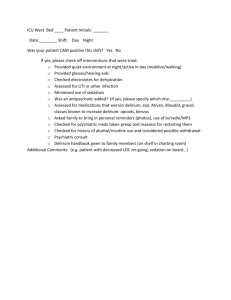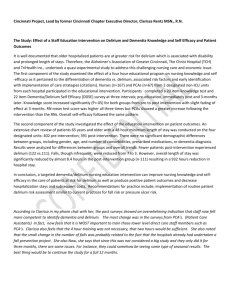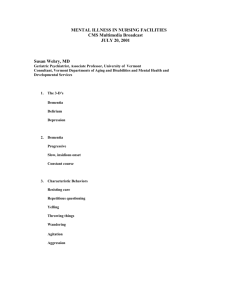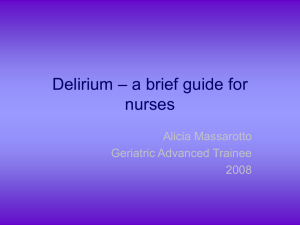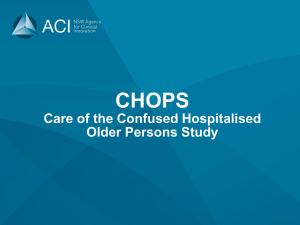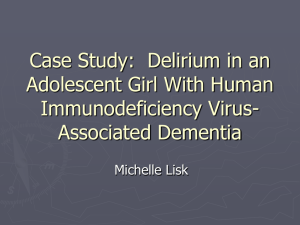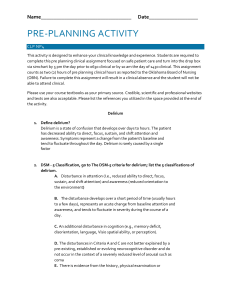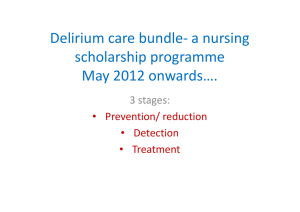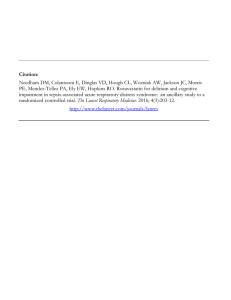Observations and ideas from experience
advertisement
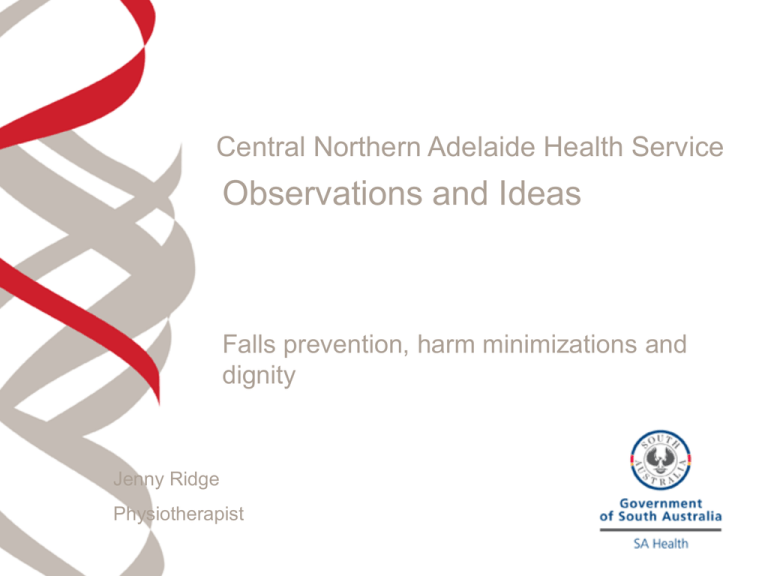
Central Northern Adelaide Health Service Observations and Ideas Falls prevention, harm minimizations and dignity Jenny Ridge Physiotherapist 1 in 5 people suffer a mental illness > All health professionals see people with mental health issues. > Do we always recognise it? > Do we make assumptions? > Do we misdiagnose? Scenario 1 > 85 year old male Recently moved into a retirement home. Diagnosis of depression. Reported unsteady gait with several falls recently . Recent cognitive decline apparent. Sleeping a lot. > Medical History: Hearing impaired, diabetes, blood pressure, gout, cholesterol, arthritis, cataracts > What are some of the things you start to think about ? Scenario 2 > 85 year old gentleman relatively long term resident of RCF. Diagnosis of dementia but recently “aggressive” towards staff with “difficult to manage behaviours‘ > Recently disorientated and wandering into other residents rooms. > Unsteady gait, keeps forgetting w/frame. > Keeps going to the toilet > Talks about insects climbing up walls at night > Constantly plucking at bed clothes > What do you think about here Scenario 3 > 75 year old woman with history of Bipolar affective disorder (taking lithium). > Lives alone. > Referred with a history of recent confusion / cognitive decline > Decline in mobility with frequent falls due to possible “Parkinson's’ disease.” > What do you think of here Scenario 4 > 60 year old resident in an extended care unit. History of schizophrenia. Staff report increasingly agitated behaviours with frequent falls. Bruising evident both knees. > Bloating of abdomen noted. > Poor historian but cognitive decline apparent > What are some of the things you start to think about ? Answers > 1. Investigations revealed poor medication compliance and understanding. Medical review/ Webster pack/ chronic disease management program/ exercise group. > 2. Delirium due to UTI. Treated. > 3. Investigations revealed lithium toxicity. Medication review education. Assistance with mobility aids and education while medication review in place. > 4. Investigations revealed constipation. Painful knees treated. Mobility balance review. Harm minimization interventions. We know that > Altered mental state does contribute to the risk of falls. > Often with adverse consequences in the elderly But! > Everyone of these clients had good outcomes. > Their balance and mobility improved and they stopped falling with minimal intervention. > What can we conclude? Is everything as it appears ? > With an ageing population there is an increasing population with a predisposition to developing psychological and co existing health issues. > We need to recognize intertwining of mental and physical health issues. > Remember the importance of investigation. > The ability to differentiate among three prevalent disorders of > delirium > dementia > depression > may lead to early identification and treatment of potentially reversible causes of confusion, and to an increase in the quality of life for older adults. Why worry about delirium? > Delirium is the most common psychiatric syndrome in acute care settings and one of the most preventable adverse events during hospitalisation. (At least 30 -40 % of cases are considered preventable.) It is grossly under recognised and poorly understood. > Once delirium occurs interventions are less effective so preventing delirium is the most effective strategy (Inouye, 2006, Foreman et al 2001) > Differentiation requires skilled assessment > This may be more challenging where there is a pre existing cognitive decline or mental health issue. Remember the importance of referring on for expert help and for screening. For example dementia screening includes but is not limited too:……….. > > > > > > > > A good history Electrolytes, liver function tests Full blood Examination B12 and folate Iron studies Urine micro culture sensitivity Thyroid function tests Check whether the person is on drugs such as lithium, sodium valproate, digoxin etc and when they were commenced or altered. > and don’t forget syphilis screening may be appropriate Advocate on behalf of our clients. There is a tendency for health practitioners to look less into the medical status of the patient when the following occurs; > > The presenting symptoms fit into a well defined psychiatric syndrome: or The person is known to have an established psychiatric diagnosis (Oppenheim, 1982) People with mental health issues often: > don’t appear to access and receive the same treatment that PWOMI would expect. > Experience social isolation and lack of support. > Have associated behaviours that have high health risks (e.g. smoking, alcohol and other substance abuse, obesity, poor diet, lack of exercise). Intervention > Must always adopt a person centred and holistic approach based on a sound history and thorough assessment. > In practice evidence exists to support modification of risk. > Where history is difficult to obtain opportunistic assessment and intervention is probably warranted.
